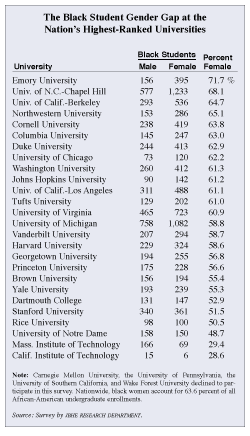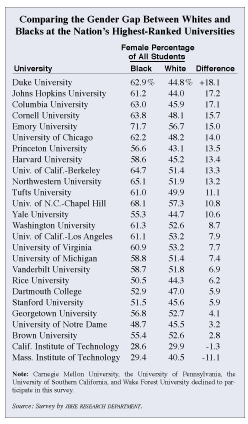| Black Women Students Far Outnumber Black Men at the Nation's Highest-Ranked Universities The wide gender gap that prevails at all stages of African-American higher education extends to the student bodies at our nation's highest-ranked universities. But in most cases the gap is smaller than the national average.
JBHE has consistently documented the fact that black women hold a large lead over black men in almost every facet of higher education. Black women currently earn about two thirds of all African-American bachelor's degree awards, 70 percent of all master's degrees, and more than 60 percent of all doctorates. Black women also hold a majority of all African-American enrollments in law, medical, and dental schools. Looking exclusively to undergraduate higher education, the latest Department of Education figures show that black women account for 63.6 percent of all African-American enrollments. JBHE recently surveyed the nation's 30 highest-ranked universities to determine if the gender gap in African-American higher education was more, or less, pronounced at these institutions than in the nation as a whole. The answer is that there is a gender gap, but it is generally smaller than the national average.
Twenty-six of the 30 highest-ranked universities responded to our survey. Those institutions that declined to provide black enrollment data by gender were Wake Forest University, the University of Pennsylvania, the University of Southern California, and Carnegie Mellon University. The JBHE survey found that at 23 of the 26 institutions that responded to our queries, there were more black women enrolled than black men. Only at the University of Notre Dame, the Massachusetts Institute of Technology, and the California Institute of Technology did black men outnumber black women. The curriculum at CalTech and MIT is heavily oriented to the sciences, engineering, and mathematics, fields where men typically outnumber women by a large margin. The reason for the comparatively low number of black women at Notre Dame is not apparent. Women were not admitted to the university until the early 1970s. Even today, it should be noted that men of all races greatly outnumber women at Notre Dame. Black women make up a very large 71.7 percent of all African-American enrollments at Emory University in Atlanta. This is the largest black gender gap among the 26 universities in our survey. Also, black women are 68.1 percent of the African-American enrollments at the University of North Carolina at Chapel Hill. At Berkeley, Northwestern, and Cornell, black women make up a larger percentage of the total African-American enrollments than the national average, which as stated earlier is 63.6 percent. But at the vast majority of high-ranking universities, the black student gender gap is less pronounced than the national average. However, it must be pointed out again that in almost all cases, black women substantially outnumber black men at these institutions.
Why is the black gender gap in enrollments generally smaller at these high-ranking universities than in the nation as a whole? In all probability, the reason is because these institutions are highly selective in their admissions policies. Harvard, Princeton, Yale, and Stanford admit fewer than one in eight students who apply. Thus, these universities have great leeway in molding their student bodies to create racial, ethnic, and gender diversity. It is reasonable to assume that if these universities take race into account in the admissions process, they might also consider gender. As a result, black men might have a slight advantage over black women in the admissions process as these universities make an effort to balance the student body by race and gender. The Black-White Gender Gap In examining the gender gap among black students at these high-ranking universities, it is also useful to compare the black gender gap to the differences among white students. At 24 of the 26 universities in our survey, the gender gap among black students is greater than the gender gap that exists among white students. At CalTech and MIT, black women make up a smaller percentage of the total enrollment of their race than is the case for whites. As stated earlier, black women outnumber black men at 23 of the 26 universities in our survey. But among whites, women outnumber men at only 11 of the 26 institutions. In many cases, the differences in the gender gap are huge. For example, at Duke University black women make up nearly 63 percent of all African-American enrollments. For whites, women are only 44.8 percent of all white enrollments. This is more than an 18 percentage point difference. At Johns Hopkins, Columbia, Cornell, the University of Chicago, and Tufts, black women make up more than 60 percent of the total African-American enrollments. But at all these universities white women are outnumbered by white men. At one half of the universities in our survey the percentage of black women enrollments among the African-American student body is more than 10 percentage points higher than the percentage of Caucasian women in the overall white student body. Obviously the African-American undergraduate college student gender gap at our highest-ranked universities is cause for major concern. The fact that black women significantly outnumber black men at these institutions will have a spillover effect in graduate school, in professional positions, and in leadership posts in our society. The fact that far more black women than black men will achieve the credential of a diploma from these top schools means that far more women than black men will be admitted to the nation's best graduate and professional schools. In turn, far more black women than black men will go on to become lawyers, doctors, and corporate leaders. | |





